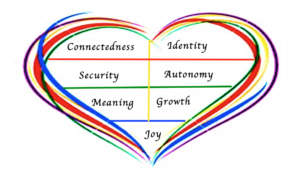‘Challenging Behaviours’ are Unmet Needs in Action
Do you remember the story of my mummy’s struggle with my late-grandfather’s refusal to shower for days which I shared some time back? For those who have not read that story, let me recap for you. My late grandfather had dementia. Once my mum called me, complaining angrily about his showing of his fist to her whenever she asked him to take shower. She was upset as she interpreted his showing of fist as a sign of aggression and as a sign that his dementia had grown worse, and worse days of caregiving looming ahead for her. My mummy is very particular about hygiene and cleanliness, while my grandfather had never smelled unpleasantly or looked untidy for as long as I had known him. He had always been a well-groomed man always in his long-sleeved white shirt and pants, with his hair neatly styled with Brylcreem, and his fortnightly hair-cut at the Indian barber shop. To my mummy, his showing of fist is a challenging behaviour as it was preventing her (his caregiver) from getting his daily activities of living done; but I know that ‘challenging behaviour’ is a sign of unmet need. Moreover, it was very uncharacteristic of him to not want to shower with his track record in grooming himself all those years.
In general, humans have the following fundamental needs, and getting those needs met is crucial and fundamental to all of us, even the persons living with dementia (PWDs). Yes, it applies to my late-grandfather too. The tricky part is to figure out which of these needs have not been met by my mummy attempts to get him to shower and how to get the needs met without having to communicate the unmet needs via ‘challenging behaviours’. If you have spoken to sufficient caregivers, you will know that besides showing of fist, ‘challenging behaviours’ include shouting, verbal swearing, actually pinching (of self or caregiver), refusal to eat, etc.

To solve this unmet need(s) puzzle, I paid them a visit. I told my late-grandfather that I would like to help him to take a shower and shampoo his hair using words and hand gestures so that he could understand better. He refused by waving his hand. I went on to explain to him that it was unpleasant to smell him, and repeated my request to shower and shampoo for him. He finally agreed to only shower without any display of fist. Ah, so shampooing his hair is the puzzle piece. But which category of need does that fall under? Using my knowledge on how the barber would wash his hair after every hair cut, I walked over to the sink in the bathroom and demonstrated to him to hold on to the two sides of the sink and bend over the sink while I would wash his hair just like at the barber shop. And viola, he nodded his head in agreement. And the whole shower went on without any raising of fist or struggle. After showering for my late-father, Sheriff Susan continued with her investigations and interviews. Finally, I found out that unmet need puzzle pieces! Sense of security and autonomy! His new helper, on her first day of work, had washed his hair like washing a car, allowing soap water to flow down from his head into his face, eyes, nose and mouth, and he obviously disliked that. That threatened his sense of security, losing his familiar way of hair-washing. In his non verbally-communicative state, to (re)gain control of his life and shower preference, he protested against showering. His fist was not a sign of aggression, but a sign of self-defence. Alas, how my mummy had wronged him! Many a times, PWDs acted in an aggressive manner not to intentionally hurt the caregivers but as a self-defence against whatever the caregivers were trying to FORCE them to do.
Yes, PWDs will act in a manner that is challenging to the caregiver due to their needs being unmet. Even for some of us, we may act in a challenging and unreasonable manner when your boyfriend forgot that bouquet of flowers on your birthday or when your husband forgot that bouquet of flowers on your wedding anniversary as that act of forgetting threatened your sense of security in that relationship, your importance to that person.
Some of you may be receiving feedback from the dementia daycare that your parent has been banging relentlessly on doors at the dementia daycare. This may be a sign of an unmet need for security as they are surrounded by unfamiliar faces, unfamiliar places, furniture, routines. In such a case, of course, going home to their familiar environment, their loved ones, their personal routines seem to be of paramount importance to them, hence, they are trying their best to open the door to get their need for security met – to go home. Or it can be a case of feeling lacking a sense of identity at the centre. Whatever the unmet need may be, it is important for you, the caregiver, to play detective and uncover it. Your loved one with dementia is not trying to frustrate you by acting in an uncooperative or challenging manner. He/she is trying to signal to you – as best as they are capable of – that certain important needs of theirs have not been met. So start playing detective instead of feeling upset or frustrated.